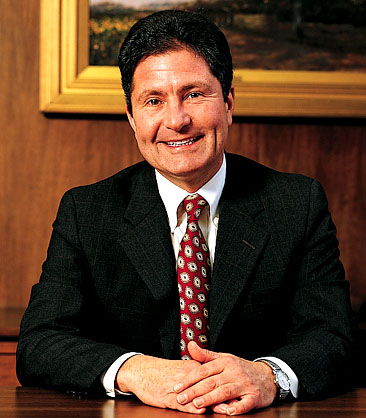

It struck me that those two pages spoke volumes about the range, quality, and broad impact of research at the University of Washington. But it struck me also how much--necessarily--was left out of those stories, especially about the way research gets done at a place like this. My own understanding of the process gained immensely from participating, last fall and winter, in a series of meetings held by the regents' strategic planning committee--a fascinating survey of the what, how, why, and who of UW research.
A historian like me tends to think of research in terms of the lone scholar in the library. For others, the mental image may be a scientist in a white lab coat peering at a test tube. These images are not false, but they don't begin to do justice to the vast, varied, dynamic, high-tech, messy research enterprise at a modern university.
In scientific fields especially, modern research is very much a team sport. Even the "stars"--and the UW has a number of them---function more as captains than as solo virtuosi. At the simplest level this means a single lab in which one professor sets the basic research agenda, writes the grant proposals, and supervises a team of students (graduate, post-doc, undergraduate) who do most of the actual experiments. But many research communities are far more complex, involving inter-disciplinary, inter-institutional, university-industry, and even international teams. All research is driven, as Provost Lee Huntsman remarked to the regents, by "the power of the question," and we are asking more and more questions that are beyond the province of the single individual or even the single field of study.
If this communal aspect of research was one big message of the regents' meetings, another was the pivotal role of the graduate student. In a very real way, university research exists to educate graduate students. They are the ones, by and large, who roll up their sleeves and do the work, learning the art and craft of research and producing new knowledge in the process. At the same time, they serve as mentors to the increasing number of undergraduates who join UW research teams. And of course they also do indispensable work as TAs. (Contrary to popular legend, UW teaching assistants generally get high marks from their undergraduate students.)
Most of you know that the UW ranks second in the nation in federal research funding, that this record directly reflects the caliber of our faculty, and that continuing to attract and retain such faculty is a matter of urgent concern in the current funding climate of the state. But you may not realize how important an ingredient in this mix is the quality of our graduate students. For faculty, graduate students who will stimulate and challenge them at the highest level are a powerful draw. "Students of this quality," said one professor after a presentation by her graduate students at a regents' session, "lead us in new directions."
The UW competes nationally for talented graduate students, and we have done very well. This year, for example, 65 National Science Foundation Fellows and 18 Howard Hughes Fellows were doing graduate work on our campus. Along with their 8,000 or so fellow graduate and professional students, they come here to work extremely hard and, in the bargain, endure considerable privation. A few years down the road, they will be filling crucial roles in our society: curing disease, teaching college students, presiding over courtrooms, pushing back the frontiers of science.
Research and graduate education are the "signature" missions of the University of Washington. Hearing about them, in the broad sweep of stories presented to the regents, was exciting and inspiring. I wish you could all have been there.
Richard L. McCormick
President
President McCormick's Page on the Web
Send a letter to the editor at columns@u.washington.edu.